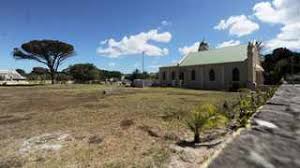
The hundred-year-old burial ground at the Al Jaamia Masjid in Stegman Road, Claremont, will be opened again due to the amount people dying of Covid-19. Photographer: Armand Hough/African News Agency(ANA)
Faizel Patel – 21/01/2021
The Muslim Judicial Council’s (MJC) second deputy president Sheikh Riad Fataar says there has been a lot of groundwork that has been done to allow Muslim burials to once again take place at Al Jaamia Mosque Cemetery in Claremont, Cape Town.
Sheikh Fataar was speaking to Radio Islam on Thursday about the historic moment for the Muslim community.
It has been nearly a 100 years since the Al Jaamia Mosque Cemetery was allowed for use in Muslim burials.
The first burial at the Al Jaamia Mosque Cemetery took place in 1868, but was forced to close its doors to the public during the apartheid years with the last burial taking place in 1901.
Sheikh Fataar says Ulama and Imams prior to him have done most of the negotiating to get the cemetery reopened.
He says the cemetery had fallen into disarray
“A lot has happened to the cemetery. Vagrants had moved in and people had started to take over the maqbara in a very bad way of things that has happened there. In that way the Muslim Judicial Council kept contact with the maqbara as well of the city of Cape Town to open it.”
Sheikh Fataar says there were huge challenges in reopening the Al Jaamia Mosque Cemetery.
“Because Cape Town has a high water table, the city required an environmental impact assessment as well geotechnical studies. Those two things normally throughout any grounds are wanted for burial. These were the things they were talking about.”
Sheikh Fataar says the reopening of the cemetery comes at a good time because Cape Town is running out of burial space.
“When you look at Janaza’s across South Africa, we are looking at an average daily Janaza’s of thirty to forty-five people per day, Allah grant them all Jannat-ul-Firdous. We have maqbara’s that has now reached capacity so therefore the burial space is much needed.”
Sheikh Riad Fataar says they are hoping to get the approval for the Heritage Council for the Al Jaamia Mosque Cemetery in the next few days.
Listen to the interview with Sheikh Riad Fataar







0 Comments